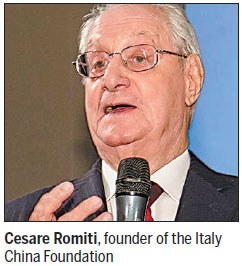Foundation offers solid foundation for partnership

Dialogue is the watchword in promoting ties
The activities and business models of Italian companies in China have changed greatly over the years because of China's economic growth, resulting in more opportunities for both countries, says Cesare Romiti, founder of the Italy China Foundation.
The foundation, established in 2003 to promote business and cultural collaboration, has grown significantly and now serves mainly Italian companies and organizations operating in Italy and China, and Chinese multinationals.
|
The Italy China Foundation opened its first Chinese branch in Chongqing this month. Photos provided to China Daily |
Romiti says the nature of the Chinese economy has changed over the years, creating opportunities for Italian companies that entered the country mainly to make the most of its low-cost manufacturing. Those companies had their eyes firmly on exports, but now they are keen on the Chinese consumer market.
Italian companies are learning to adapt to the Chinese market by employing local managers, Romiti says.
The Italy China Foundation's board is made up of Italian government representatives, representatives of local authorities and the confederation of Italian industry, and Italian businesses and financial groups.
"The goal from the beginning was to open up dialogue between Italy and China from an economic, cultural and scientific point of view," Romiti says.
The foundation has served as a bridge between public and private sectors for businesses to communicate their ideas to the government and among each other. The foundation has also supported many Italian firms wanting to move into China by introducing them to the right partners.
The foundation also organizes events such as the China Awards and Italy China Career Day. It also publishes an annual report on China and a periodical called Mondo Cinese.
In 2009, the foundation opened its School of Permanent Formation, which offers Italian and Chinese language courses for students and businesses, and organizes many cultural activities. The school now has more than 500 students.
This month, the foundation opened its first Chinese branch of the school, in Chongqing. Its students have the opportunity to study in the foundation's school in Milan, and later at Italian universities. This program is organized by the foundation in partnership with the Uni-Italia Association, created in 2010 through the joint efforts of Italy's Ministry of External Affairs, the Ministry of Instruction, University and Research, and the Ministry of Internal Affairs. The number of Chinese students studying in Italy under its auspices grew 240 percent between 2008 and 2014.
Romiti says the key focus of China's and Italy's commercial exchanges, based on a cooperation agreement the two countries have signed, are agribusiness, environmental technology, healthcare and urbanization.
Much of the trade between the two countries is in machinery and nuclear technologies, chemical products, leather articles, textiles, transport equipment, machinery and electronic facilities, metal articles, music, optical and photographic instruments, plastic and rubber articles, and shoes and accessories, he says.

Most of the Italian companies in China have targeted the Chinese market using the appropriate strategies and mid- to long-term goals, which explains their success, Romiti says.
But Italian firms are not short of challenges in China, especially in protecting intellectual property rights, as well as their need to learn about a new language and culture, find the correct local partner, and find highly skilled and suitable workers.
Other ingredients for Italian companies looking to succeed in China include the ability to build solid and stable management teams, the ability to allocate decision-making power to Chinese subsidiaries and adapting to the way decisions have to be made in China.
"We have to make ourselves 'Chinese' by aligning our Western business model with the challenge of entering and growing in China," Romiti says.
Many more Chinese firms are investing in Italy, mainly in a process of searching for new markets to raise their profile, and in a search for strategic resources that they can bring back home to utilize in their own firms, he says.
There are many more business opportunities for bilateral collaboration in high-technology and financial services sectors, Romiti says.
"Thanks to the gradual liberation of the Chinese market, the implementation of reforms in China's financial markets and the increasingly internationalized Chinese currency, there are many opportunities for collaboration in financial services."
Tourism is another key area of great potential bilateral collaboration, he says, especially considering China's large tourist numbers.
cecily.liu@chinadaily.com.cn
(China Daily European Weekly 06/19/2015 page13)
Today's Top News
- Japan tempting fate if it interferes in the situation of Taiwan Strait
- Stable trade ties benefit China, US
- Experts advocate increasing scope of BRI to include soft power sectors
- New engine powers cargo drone expansion
- China to boost green industry cooperation
- Manufacturing PMI rises in November































